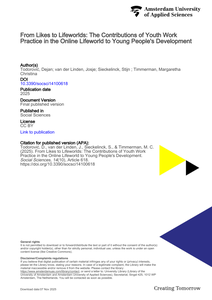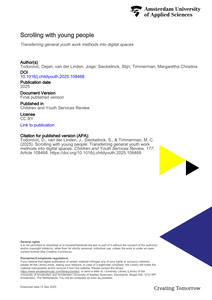Previous research has suggested that professional youth work settings empower socially vulnerable youngsters, strengthening their personal development and social participation. It is expected that youth work can prevent personal and social problems of youngsters, which may have longer term positive social returns. How the underlying methodical way of acting of youth workers contributes to prevention-focused outcomes remains unclear. This article presents a four-wave longitudinal cohort study (16 months) that investigated longitudinal associations between 12 individual methodical principles that youth workers apply in interactions with youngsters and four prevention-focused outcomes: prosocial skills, self-mastery, social network and civic participation. The sample consisted of 1,597 Dutch youngsters with a mean age of 16.5 years (SD = 3.60). Findings: Linear mixed models analysis found that all individual methodical principles were longitudinally associated with one or more outcome. The strongest associations were observed with regard to prosocial skills and civic participation. Depending on the outcome measure, methodical principles seem to be more effective for boys, for youngsters who participate for 3 years or longer in youth work settings and for youngsters between 10 and 19 years old. With regard to the effect of methodical principles on improving self-mastery, 9 of the 12 principles appeared to play no positive role in increasing self-mastery of youngsters. Applications: This study provides youth workers with a better understanding of which methodical principles are positively associated with prevention-focused outcomes as well as reinforcing the evidence-based practice of professional youth work.
DOCUMENT

As youth workers increasingly offer support and guidance within digital environments, the question arises as to what impact this support has on the (online) lives of young people. This paper explores the contribution of youth work practice in the online lifeworld on young peoples’ development, building on previous studies concerning youth work outcomes and the developmental needs of young people. A qualitative research design was employed, including digital diaries of youth workers and semi-structured interviews with both young people (N = 37) and youth workers (N = 25). The findings highlight the role of youth work in helping young people navigate social media; develop new skills, talents, and social connections; and increase awareness of online risks. Youth workers also support young people in coping with negative online experiences, including loneliness and mental health challenges. The contribution of online youth work is less visible in certain aspects of developmental needs, namely online safety and privacy, self-image, and assessing online information. This paper concludes by emphasising the need for further research into the long-term impact of youth work in the online lifeworld, particularly in light of rapid technological developments, the growing influence of artificial intelligence, and the increasing involvement of youth in digital forms of crime. The findings described in this study can form a base for future research to better understand the impact of these emerging issues on youth development and youth work practice, as well as to develop appropriate interventions.
DOCUMENT

With the increasing significance of the online lifeworld in the lives of adolescents, youth work must adapt its methods to support young people’s personal development and social participation in this hybrid online space. To date, there is limited knowledge on how youth workers can effectively employ methodical actions in the online environment. This paper draws on established offline youth work methods to explore their potential transferability to the online context. The research question guiding this study is: How can offline youth work methods be used in the online lifeworld to support adolescents’ developmental needs? Using the Change Laboratory method, 26 youth workers from 14 youth work organisations in the Netherlands participated in this research. The findings suggest that while offline methods provide a valuable resource, they cannot be directly transferred to the online context without adaptation. Instead, they offer a framework for seven specific methodical actions that can be adapted or developed for the online context. They are: 1) Increasing online visibility and accessibility, 2) Orienting, 3) Signalling, 4) Making contact, 5) Building meaningful relationships, 6) Assessing needs, and 7) Providing support. By identifying these seven methodical actions which are crucial for addressing the developmental needs of adolescents online, this paper contributes to the growing body of knowledge on youth work in the online lifeworld.
DOCUMENT
